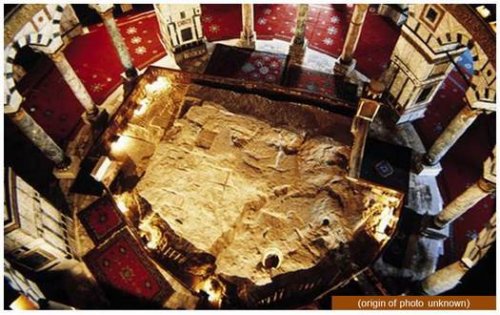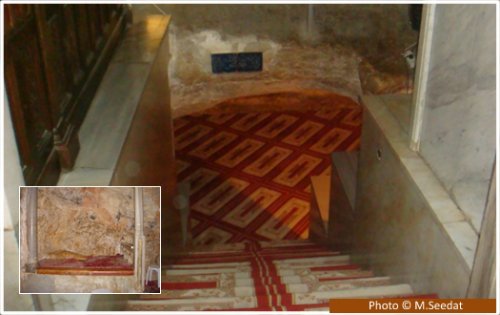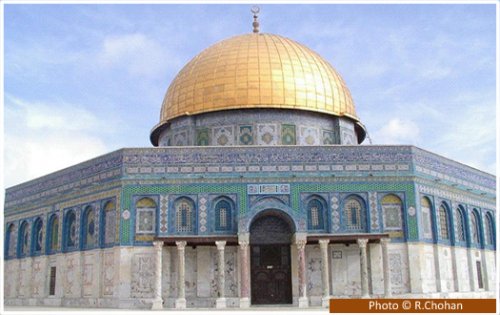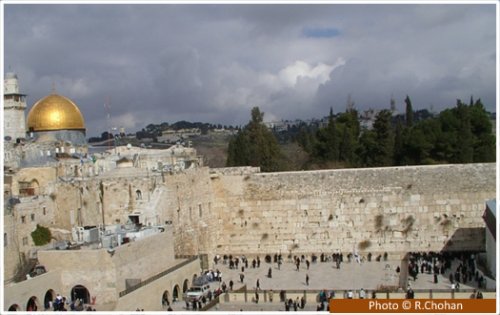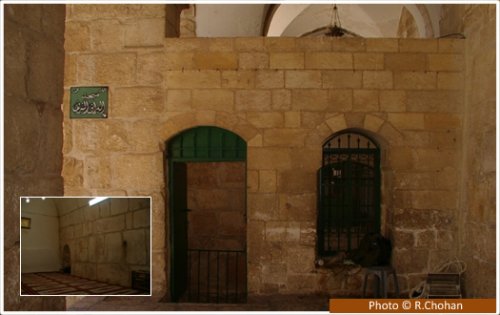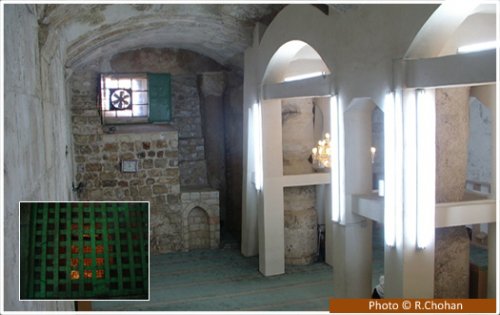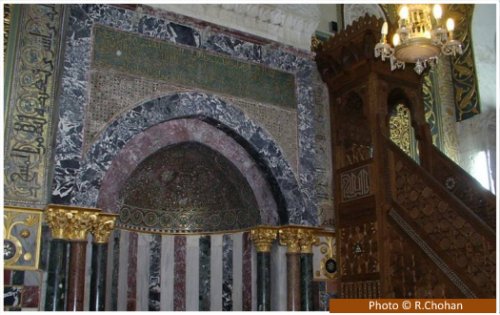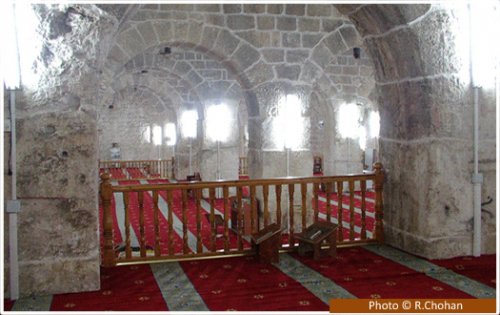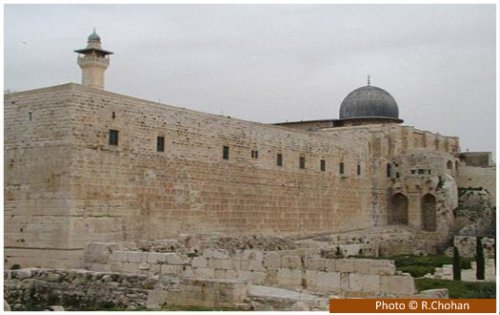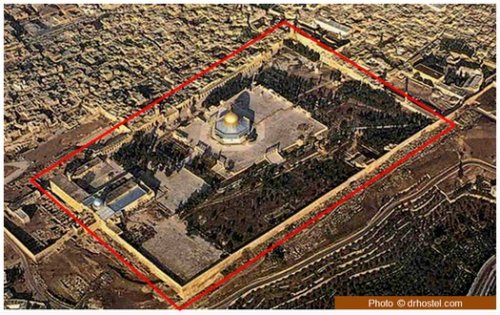-
Posts
8,434 -
Joined
-
Days Won
771
Content Type
Profiles
Forums
Events
Everything posted by ummtaalib
-
wa'alaykus salaam ww ok i see. It appears in this answer there is specific detail regarding perforated ears so you would need to ask a Mufti for further clarification
-
Alhamdulillah found some answers: "To intentionally inhale the smoke of cigarettes or odour repellent smokes such as agarbatti" will break fast which requires Qadha Mufti Faruq "Basic Principles from Ramadhan to Hajj" (Note the word "Intentionally) I'm not sure which thread you mean but both Mufti Faruq's book and the leaflet "Sawm" in the OP says to drop oil or medicine in the ear breaks fast As for the last question, all we need to know is snuffing breaks the fast. Nasal sprays and inhalers also break the fast according to Mufti Faruq's book.
-
Haafidha Rayhaanah Omar It has been said that everything has a beloved & that the month of Ramadan has a beloved, too: The Glorious Qur’an. And so for the duration of this month, Muslims worldwide honour Ramadan’s beloved and aspire to complete the recitation of the Qur’an. In this article you’ll learn how you too can work towards achieving this noble goal, insha’Allah. Step 1: Establishing an intention Our beloved Messenger taught us – through his words & actions – the importance of one’s intent or purpose. Establishing one’s intention is an effective catalyst for implementation. Once your intention has been established, remember to renew it often. Whilst reciting and even upon completion of the Qur’an, recall your intention and renew it, thus ensuring that it is constantly purified & you are seeking His Divine Acceptance, inshaAllah. Step 2: Don’t be overwhelmed For some, as much as they aspire to complete the recitation of the Qur’an during Ramadan, they are overwhelmed by the number of pages or the length of some Surahs. Remove ‘I can’t’ from your vocabulary and eliminate negative thinking, for the believer puts their trust in Allah, matched by striving with their actions. Remind yourself that you are (if Allah wills) fully capable of achieving your Qur’anic aspirations, whether it be completing Qur’an 1 or 5 times. This second point is key. Put your heart into this accomplishment & reap the rewards throughout, inshaAllah. Step 3: Plan ahead Prior to commencing with your recitation it’s important to plan around your routine and block out time for your Qur’an goal e.g. your work hours, rest hours & any other commitments which you may have. Structure a realistic plan of how to complete the recitation of Qur’an within the month by dividing each Juzz up per day. Draw up this personal plan, review it constantly, and put it into action! As you put your plan to paper, consider past Ramadans and; ask yourself if there have been instances where you were unable to complete Qur’anic recitation. Reflect over why and how this occurred. Is there a different mechanism that you could put into place? How could you enhance your daily Qur’an routine if these distractions were dealt with? Take the first opportunity that comes, to begin your Qur’anic quest. So when the moon is sighted & the announcement has been made for the 1st Salaatul-Taraweeh, begin in earnest, with Surah Al-Fatiha, Surah Al-Baqarah etc. Step 4: Understand the Qur’an Read the translation of the Juzz you will be reciting daily. Having a basic knowledge of the theme, topic, message & meaning of what you are reciting makes the recitation of the Qur’an an incredibly uplifting experience that you do not want to miss out on! Step 5: Find Qur’an Buddies and Compete in Good Develop close bonds with brothers/sisters who are known for their attachment to the Qur’an. They’ll be your spiritual friends. Engage a Qur’an Buddy in your noble Qur’an productivity goals. Request that they remind you to fulfil your goals and spiritual aspirations so they can help you in times of slacking. In life, we compete with many materialistic goals and race one another, but what about following the footsteps of the best of generations that had come before us in a competition this Ramadan? In striving and competing with our friends and colleagues towards our noble goals, in a good-natured way, we can motivate ourselves to finish our Qur’an goal. One of the common aspects which deter a Muslim from completing this task is excessive communication. Often, many of us spend too much unnecessary time surfing the net, chatting, texting, etc… . Reduce this even by a third and you will see, feel and witness the blessings in your time, inshaAllah. Step 6: Seize the Moment A deeply inspiring story in ‘lessons from the waiting room’ – where a mother; who has taken her unwell child to the hospital; waits for the doctor to see to her child. She notices a young Muslim who uses his time in the waiting room, in a most effective & spiritually rewarding way, reciting from a pocket-sized Quran. Lesson to be taken here: Invest in a pocket-sized Qur’an and make it your best friend this Ramadan. Seize every opportunity and moment to be with Allah through your recitation. One of the best times at which to recite Qur’an, is after Suhoor. Having partaken from the Sunnah meal, and within an hour or two still to go before work or school, this is the ideal jump start to your day. The Prophet asked Allah to bless our Ummah in the early hours, and you will also be more likely to memorise ayahs at this time. Research shows that morning study creates better performance in students so don’t miss the morning recitation! Time Tip: Salah Followed by Qur’an. Consider the following option that has worked well for numerous people in past Ramadans. Try reciting 6 – 8 pages of Qur’an (depending on the Mus-haf that you are using) after each of your 5 daily salah. Add Qiyaamul-Layl as a 6th addition, and you will reach the end of Ramadan, having completed your Qur’an recitation with ease & perhaps, even before the last 5 days of Ramadan so long as you remain committed. Time Tip: Recite before going to sleep. Allah says: “Indeed, the hours of the night are more effective for concurrence [of heart and tongue] and more suitable for words” [73:6]. Reciting during the day is also beneficial, however the night time recitation is easier as well during Ramadan as there are less distractions and noise. Step 7: Remain steadfast and consistent The key to any success is consistency. Once you’ve mapped your plan, stick to it. Remind yourself of the greatness of this month, of the opportunities that it provides for your spiritual growth and your relationship with the Qur’an. Don’t be willing to compromise it in this month. Step 8: Make dua’a to Allah Nothing can be achieved without the aid and guidance of Allah . When making your intention to complete your memorisation of Qur’an, supplicate to Allah to ease this noble pathway and to crown your efforts with success, inshaAllah. These are the 8 ways I wanted to share with you on starting and completing your journey through recitation of the Qur’an this Ramadan. Indeed, Allah says in Surah Al-Baqarah: “This is the Book about which there is no doubt, a guidance for those conscious of Allah.’’ In the hours of the days and nights of this sacred month, may the Qur’an be your companion of light and guidance, resonating through your words, actions and life mission. May your relationship with the Qur’an be strengthened, enriched & enlivened with the profound wisdom and divine message from Allah . About the Author British-born Haafidha Rayhaanah Omar memorised The Qur’an in less than a year & has since then, furthered her Islamic studies in numerous countries around the world. Her interests and specialty lie in ‘Uloomul Qur’an, Seerah & Ahaadeeth. For 6 years, she served as the Principal of Darul Qur’an Linn-Nisaa’, an academy of Tahfeedhul Qur’an, Itqaanul Qur’an & Uloomul Qur’an, with a student enrollment of 400 learners. An established, motivational speaker, Rayhaanah has successfully consulted thousands of women on: confidence building, time-management, goal-planning & emotional healing. She has lived, studied abroad & traveled extensively with her husband. They have an 8-year old (blogging) son, Mu’awiyah & are currently based in Johannesburg, South Africa.
-
hmmm these are questions which a learned person should answer...I cannot answer but will try to search on authentic sites. If you search and find them please post here
-
In the UK our fasts will be on hot days and they will be loooong! Allah ta'ala will make it easy for us all, O Allah make it easy and accept it from us, aameen!
-
Q. 1. What is Sadaqat-ul-FItr? A. It is a charity, the annual distribution of which is essential (Wajib) for every Muslim who possesses on the last day of the month of Ramadan or the day of 'ld-ul-Fitr goods of the value which makes them liable for Zakat. A Muslim has to pay the Sadaqat-ul-Fitr for himself or herself and for his or her minor children. Q: What is the ruling of Sadaqatul Fitr? A: It is wajib upon a free Muslim if he owns Nisab of any form of wealth, in excess of his residence, clothing, furniture, transport and weapons.* *It applies to a well-off person who is forbidden to take Zakah. ~ al-Quduri ~
-
wa'alaykumus salaam I have not read anywhere that its a sunnah. Wherever recitation of the Qur'an is mentioned in books or bayans, it is mentioned that we should recite as much as possible (more for the huffaaz) however i have heard it said that our target should be minimum, completing it at least once. Also see this: http://www.sunniforum.com/forum/showthread.php?75985-Immense-Rewards-for-Reciting-the-Qur-an-in-Ramadan
-
wa'alaykumus salaam ww Yes niyyah is necessary..following is from inter-islam The Niyyat (intention) 1. The Niyyat (intention) of fasting is NECESSARY. If a person stays away from all those things that break one's fast without a Niyyah, the fast will NOT be valid. 2. It is NOT necessary to express the Niyyat verbally as Niyyat means to intend. Thus, the intention at heart will suffice. However, it is better to express the Niyyat verbally as for dua: I need to make sure because the Niyyah in the first post is coming as a dua for fasting
-
Sunnats and Aadaab of Ramadhaan – Part 3 1. Spend time in the company of the pious servants of Allah Ta’ala in order to derive maximum benefit from this month. 2. There is a lot of barakah (blessings) in waking up for sehri. Hence, one should fulfil the sunnah of sehri before commencing the fast. عن أبي سعيد الخدري رضي الله عنه قال قال رسول الله صلى الله عليه و سلم السحور كله بركة فلا تدعوه ولو أن يجرع أحدكم جرعة من ماء فإن الله عز و جل وملائكته يصلون على المتسحرين رواه أحمد وإسناده قوي (الترغيب و الترهيب رقم 1623) Hadhrat Abu Saeed Khudri (radhiallahu Anhu) reports that Rasulullah (Sallallahu Alaihi Wasallam) said: “Sehri is full of blessings. Hence, do not omit the sunnah of sehri, even if one is able to have a sip of water at the time of sehri (one should do so in order to fulfil the sunnah of sehri). Certainly Allah Ta’ala descends His special grace upon those who wake up for sehri and the malaaikah make special duaa for them. وعن عمرو بن العاص رضي الله عنه قال قال رسول الله صلى الله عليه وسلم فصل ما بين صيامنا وصيام أهل الكتاب أكلة السحر. (مسلم رقم 1096) Hadhrat Amr bin Aas (Radhiallahu Anhu) reports that Rasulullah (Sallallahu Alaihi Wasallam) said: “The difference between our fasts and the fasts of the Ahle kitaab is the eating of sehri.” 3. It is preferable to have sehri during the last portion of the night (i.e. a little before subh-saadiq). عن أنس بن مالك رضي الله عنه أن نبي الله صلى الله عليه وسلم وزيد بن ثابت تسحرا فلما فرغا من سحورهما قام نبي الله صلى الله عليه وسلم إلى الصلاة فصلى قلنا لأنس كم كان بين فراغهما من سحورهما ودخولهما في الصلاة قال قدر ما يقرأ الرجل خمسين آية (بخاري رقم 576) Hadhrat Anas (Radhiallahu Anhu) reports that on one occasion Rasulullah (Sallallahu Alaihi Wasallam) and Hadhrat Zaid bin Thaabit (Radhiallahu Anhu) sat to partake of sehri. When they completed with the sehri, Nabi (Sallallahu Alaihi Wasallam) stood up to perform the Fajr salaah. The companions of Anas (Radhiallahu Anhu) asked him, “What was the duration of time after they completed sehri till the time the Fajr salaah was performed?” Hadhrat Anas (Radhiallahu Anhu) replied: “The duration was the time it would take a person to recite fifty verses of the Qur’an.” 4. One should have iftaar immediately after sunset. عن سهل رضي الله عنه قال : قال رسول الله صلى الله عليه وسلم : لا يزال الناس بخير ما عجلوا الفطر. قال أبو عيسى حديث سهل بن سعد حديث حسن صحيح (ترمذي رقم 699) Hadhrat Sahl (Radhiallahu Anhu) reports that Rasulullah (Sallallahu Alaihi Wasallam) said: “People will continue to remain upon goodness as long as they hasten in opening their fast.” عن أبي هريرة رضي الله عنه قال : قال رسول الله صلى الله عليه وسلم قال الله تعالى أحب عبادي إلي أعجلهم فطرا. (ترمذي رقم 700) Hadhrat Abu Hurayrah (Radhiallahu Anhu) reports that Rasulullah (Sallallahu Alaihi Wasallam) said that Allah Ta’ala says: Those servants who are most beloved in My sight are those who hasten to open their fasts at the time of iftaar. 5. It is best to open one’s fast with dates and water. عن سلمان بن عامر قال : قال رسول الله صلى الله عليه وسلم إذا أفطر أحدكم فليفطر على تمر فإنه بركة فإن لم يجد تمرا فالماء فإنه طهور (ترمذي رقم 658) Hadhrat Salmaan bin Aamir (Radhiallahu Anhu) reports that Rasulullah (Sallallahu Alaihi Wasallam) said: “At the time of iftaar one should open his fast with dates as this is full of blessings, and if this is not possible then he should drink water as this is a means of purification.” عن أنس قال : كان النبي صلى الله عليه وسلم يفطر قبل أن يصلي على رطبات فإن لم تكن فتميرات فإن لم تكن تميرات حسى حسوات من ماء . (ترمذي رقم 696) Hadhrat Anas (Radhiallahu Anhu) reports that Rasulullah (Sallallahu Alaihi Wasallam) would open his fast with fresh dates before performing the Maghrib salaah. If fresh dates were not found, then Rasulullah (Sallallahu Alaihi Wasallam) would open his fast with dry dates. If dry dates were not found, Rasulullah (Sallallahu Alaihi Wasallam) would open his fast with a few sips of water. 6. At the time of iftaar recite the following du`aa: اَللّهُمَّ لَكَ صُمْتُ وَ عَلى رِزْقِكَ أَفْطَرْتُ فَتَقَبَّلْ مِنِّيْ إِنَّكَ أَنْتَ السَّمِيعُ العَلِيم O Allah, I have kept this fast solely for You, and with Your sustenance I have opened my fast. Accept this fast from me. Indeed You are All hearing and All knowing. ذَهَبَ الظَّمَأُ وَابْتَلَّتِ الْعُرُوقُ وَثَبَتَ الأَجْرُ إِنْ شَاءَ اللَّهُ (My) thirst has been quenched, and the veins have been moistened and the reward has been obtained (by Allah Ta’ala) Insha Allah. عن معاذ بن زهرة قال : إن النبي صلى الله عليه وسلم كان إذا أفطر قال : اللهم لك صمت وعلى رزقك أفطرت. ( أبو داود رقم 2360) Hadhrat Muaaz bin Zuhrah (Radhiallahu Anhu) reports that Rasulullah (Sallallahu Alaihi Wasallam) would recite the following Duaa at the time of opening the fast: اَللّهُمَّ لَكَ صُمْتُ وَ عَلى رِزْقِكَ أَفْطَرْتُ عن ابن عباس رضي الله عنهما قال كان النبي صلى الله عليه و سلم إذا أفطر قال : لك صمت وعلى رزقك أفطرت فتقبل مني إنك أنت السميع العليم رواه الطبراني في الكبير وفيه عبد الملك بن هارون وهو ضعيف (مجمع الزوائد رقم 4893) Hadhrat ibn Abbaas (Radhiallahu Anhuma) reports that Rasulullah (Sallallahu Alaihi Wasallam) would recite the following Duaa at the time of opening the fast: اَللّهُمَّ لَكَ صُمْتُ وَ عَلى رِزْقِكَ أَفْطَرْتُ فَتَقَبَّلْ مِنِّيْ إِنَّكَ أَنْتَ السَّمِيعُ العَلِيم عن ابن عمر رضي الله عنهما قال : كان النبي صلى الله عليه وسلم إذا أفطر قال : ذهب الظمأ وابتلت العروق وثبت الأجر إن شاء الله ( أبو داود رقم 2359) Hadhrat ibn Umar (Radhiallahu Anhu) reports that Rasulullah (Sallallahu Alaihi Wasallam) would recite the following Duaa at the time of opening the fast: ذَهَبَ الظَّمَأُ وَابْتَلَّتِ الْعُرُوقُ وَثَبَتَ الأَجْرُ إِنْ شَاءَ اللَّهُ 7. Be generous in the month of Ramadhaan. Nabi (Sallallahu Alaihi Wasallam) would express the most amount of generosity in the month of Ramadhaan compared to the other months of the year. عن ابن عباس قال كان رسول الله صلى الله عليه وسلم أجود الناس وكان أجود ما يكون في رمضان حين يلقاه جبريل وكان يلقاه في كل ليلة من رمضان فيدارسه القرآن فلرسول الله صلى الله عليه وسلم أجود بالخير من الريح المرسلة (بخاري رقم 6) adhrat ibn Abbaas (Radhiallahu Anhuma) reports that Rasulullah (Sallallahu Alaihi Wasallam) was the most generous of people. He would reach the peak of his generosity in the month of Ramadhaan when Hadhrat Jibra’eel (Alaihis Salaam) would come to meet him (to make dhor and revise the Qur’an). Hadhrat Jibra’eel (Alaihis Salaam) would meet him every night in Ramadhaan wherein they both used to recite the Qur’an Majeed to each other. Rasulullah (Sallallahu Alaihi Wasallam) was more generous than the (beneficial) wind that blew (i.e. the wind is known for having no boundaries and it reaches all places, hence the generosity of Rasulullah (Sallallahu Alaihi Wasallam) even surpassed the limits of the wind in showing love and compassion for the creation). Ihtaaud Deen
-
Wa'alaykumus salaam ww awwww poor thing! InshaAllah she will be ok. Allah grant her 'aafiyat and strengthen her, aameen.
-
Interior of The Dome of the Rock This rock is believed to be the place from where the Prophet Muhammed (peace and blessings of Allah be on him) ascended to heaven (mi’raj) during his night journey to Jerusalem. It is the opinion of some scholars that the angel Israfeel (upon him be peace) will blow the soor (trumpet) from this place to herald the Day of Judgement. When the Crusaders took over the site they covered the Rock with a marble facing to make an alter and choir, and the interior Quranic inscriptions were covered with Latin texts, all aimed to blot out Muslim presence. Salahuddin Ayyubi had the building restored after the Muslims reconquered it. Jews and Christians believe this is the place where the Prophet Ebrahim (upon him be peace) was prepared to sacrifice his son Ishaq (upon him be peace) after seeing a dream indicating for him to do so. This is a fundamental difference to the Muslim belief that it was actually his elder son Ismail (upon him be peace) who he was prepared to sacrifice and that this happened in Mina, Saudi Arabia. Inside the Dome, the major Quranic inscription over the arches of the inner arcade is addressed to the “Followers of the Gospel”, i.e. Christians, denying the shocking notion that God had sired a son. It warns them against inaccurate and dangerous statements about God (in Surah An-Nisa):“O People of the Scripture! Do not exaggerate in your religion nor utter aught concerning Allah save the truth. The Messiah, Jesus son of Mary, was only a Messenger of Allah, and His word which He conveyed unto Mary, and a spirit from Him. So believe in Allah and His messengers, and say not “Three” – Cease! (it is) better for you! – Allah is only One God. Far is it removed from His transcendent majesty that he should have a son. His is all that is in the heavens and all that is in the earth. And Allah is sufficient as Defender.” [4:171] Underneath the Dome of the Rock The main picture above shows the stairways leading down to the small cave underneath the Dome of the Rock. The picture inset shows an internal view. This cave has been called ‘The Well of Souls’ (Arabic: Bir el-Arweh) as some believe this is where the souls of the dead gather to wait for the event of Judgement Day. However, this is a myth as is the notion that the rock above it is floating without any support. Islamiclandmarks
-
The Dome of the Rock http://youtu.be/bcqQC_Zlyp0
-
The Dome of the Rock The Dome of the Rock (Qubbatus Saqqara) is often mistakenly referred to as the al-Aqsa mosque. This structure was built by Caliph Abd al-Malik from 688 to 691 CE and houses the sacred rock from which the Prophet Muhammed (peace and blessings of Allah be on him) ascended to heaven (Mi’raj) after the night journey to Jerusalem (Isra’). When the Crusaders took over Jerusalem, the Dome of the Rock mosque was re-named Templum Domini and had a cross placed on top of the golden dome. The Qibly mosque was re-named Templum Solomonis. This Kingdom was to last 87 years, during which time neither Jew nor Muslim was allowed to dwell within the walls of the city. Ibn Kathir (Allah show mercy on him) writes in his book Kamil at-Tawarikh (The Perfect History) of the scene when the Muslims recaptured Jerusalem from the Crusaders:“…At the top of the cupola of the Dome of the Rock there was a great gilded cross. When the Muslims entered the city on the Friday, some of them climbed the top of the cupola to take down the cross……a great cry went up from the city and from outside the walls, the Muslims crying ‘Allahu-akbar’ in their joy, the Franks groaning in consternation and grief. So loud and piercing was the cry that the earth shook. …Salahuddin ordered that the shrines should be restored to their original state. The Templars had built their living quarters against al-Aqsa, with storerooms and latrines…This was all restored to its former state. The Sultan ordered that the Dome of the Rock should be cleansed of all pollution, and this was done…” The beautiful external tile work which can be seen today was commissioned by Sulayman II Qanuni (the Lawgiver), known throughout Europe as Sulayman the Magnificent. With the incomparable skills of Persian master ceramicists, 40,000 tiles were fired and put into place, crowned by the inscription of Surah Yasin, the 36th chapter and regarded as the heart of the Quran. Orthodox Jews believe the Dome of the Rock to be the centre of the world.
-
Masjid Al Aqsa from the Inside, Jerusalem, Palestine http://youtu.be/n3rAPa9Y3As
-
Buraq wall (Western/Wailing wall) This wall, formerly referred to as the ‘Wailing Wall’ and now more commonly known as the ‘Western Wall’ is the most sacred place for Jews who believe it to be the only surviving structure of the Herodian temple. For Muslims it is known as the Buraq Wall, for on the other side is where the Prophet Muhammed (peace and blessings of Allah be on him) tied the Buraq, the winged riding animal upon which he rode during the Night of Ascension. The area which the current plaza occupies used to be residential housing called the Maghribi (Moroccan) Quarter. It was endowed by Al-Afdal, the brother of Salahuddin so that aid and services could be provided for North African pilgrims and the poor; he also built a madrasah where the fiqh (jurisprudence) of the Maliki school of thought could be taught and studied. During the Mamluk period, madaris (seminaries) had been built all along this wall, except for a stretch of about 22 meters between the Street of the Chain (Tariq al-Silsila) and the Maghribi Gate. Jews had never previously shown any particular interest in this portion of the wall. Though they consider it to be the only surviving remnant of the Second Temple, the Wall was never actually part of the Temple as such, but rather the western wall of a retaining structure built under Herod to support the plaza above. In the section that is openly visible there are in fact another nineteen courses of stones beneath the modern-day ground level. In Herod’s day, the place had been a part of a shopping centre and had no religious significance. When the Romans destroyed Herod’s Temple after the Jewish War in 70 CE, only the western wall of the Temple’s inner sanctum was left standing, but over the centuries that followed, Jewish pilgrims in Jerusalem gathered for prayer on Temple Mount where possible, or on the Mount of Olives when not. The Western Wall became a permanent feature in Jewish tradition in around 1520 as the idea spread that Jewish people should not enter the Temple sanctuary itself because they were no longer able to attain the necessary degree of ritual purity. Jews began instead to gather in front of this wall to pray, and gradually traditions which had been associated with the western wall of the Temple’s inner sanctum transferred themselves to this wall. The old city was given its definitive shape in the 16th century by Sulayman the Magnificent, who built the present day massive stone walls of the old city in 1537. It is said that he had a dream in which the Prophet Muhammed (peace and blessings of Allah be on him) commanded him to organize the defence of Jerusalem. During the construction of the city wall, Sulayman issued an official edict permitting the Jews to have a place of prayer at the Western Wall. The famous Turkish architect Koca Sinan (who designed the Suleymaniye Mosque in Istanbul) is said to have designed the site, excavating downward to give the wall added height and building a wall parallel to it to separate it from the Maghribi Quarter, creating an alley about 3.5 metres wide. In Jewish legend Sulayman was said to have helped clear the site himself and to have washed the wall with rose water to purify it, as Umar (may Allah be pleased with him) and Salahuddin had done when they reconsecrated the Sanctuary. Under the terms of the Status Quo on holy sites, a decree fixed by decree of the Ottoman Sultan in 1757 and codified in more detail by a British government Commission in 1922, the Wall is technically Muslim property, belonging to the Waqf, who also own the synagogue area in front of it. Jews however, have the right to stand on the pavement in front of it and pray. One of the first acts of the Israelis, upon taking over East Jerusalem during the 1967 war was to give the 619 Palestinian inhabitants of the Maghribi Quarter just three hours to evacuate their homes. Then the bulldozers came in and destroyed this historic district. This act, in contravention of the Geneva Convention was done in order to create a plaza big enough to accommodate the thousands of pilgrims who were expected to flock to the Western Wall. Close up, the Wall resembles an enormous message board from the Jews to the Almighty; every nook and cranny in its massive ancient stones is stuffed with slips of paper bearing personal prayers. Ancient it may be but the Wall is bang up to date with modern communications; through a commercial website Jews can have an Orthodox Jew pray for them at the Wall for forty days – the price varies between US$90 and US$1800 depending on whether they want a standard,exclusive or premier prayer. References: Al-Quds – Mohammed Abdul Hameed Al-Khateeb, A history of Jerusalem – Karen Armstrong, Western Wall – Ben Dov, The Rough Guide to Jerusalem Courtesy of Islamiclandmarks.com
-
Buraq masjid This small structure, on the south-west corner of the al-Aqsa compound is believed to be the place where the Prophet Muhammed (peace and blessings of Allah be on him) tied the Buraq, the winged riding animal upon which he rode during the Night of Ascension. The wall on the right is the other side of what the Jews call the Wailing Wall. It is narrated on the authority of Anas bin Malik (may Allah be pleased with him) that the Prophet (peace and blessings of Allah be on him) said, “I was brought al-Buraq who is an animal white and long, larger than a donkey but smaller than a mule, who would place his hoof a distance equal to the range of vision. I mounted it and came to Bayt al-Maqdis. I tethered it to the ring used by the prophets. I entered the mosque and prayed two rak’ahs in it, and then came out and Jibraeel brought me a vessel of wine and a vessel of milk. I chose the milk, and Jibraeel said: You have chosen the natural thing. Then he took me to heaven. Jibraeel then asked the (gate of heaven) to be opened and he was asked who he was. He replied: Jibraeel. He was again asked: Who is with you? He (Jibraeel) said: Muhammed (peace and blessings of Allah be on him). It was said: Has he been sent for? Jibraeel replied: He has indeed been sent for. And (the door of the heaven) was opened for us and lo! we saw Adam (upon him be peace). He welcomed me and prayed for my good. Then we ascended to the second heaven. Jibraeel asked for the door of heaven to be opened, and he was asked who he was. He answered: Jibraeel; and was again asked: Who is with you? He replied: Muhammed (peace and blessings of Allah be on him) It was said: Has he been sent for? He replied: He has indeed been sent for. The gate was opened. When I entered ‘Isa bin Maryam and Yahya bin Zakarriyah (upon him be peace), cousins from the maternal side, welcomed me and prayed for my good Then I was taken to the third heaven and Jibraeel asked for the opening (of the door). He was asked: Who are you? He replied: Jibraeel. He was (again) asked: Who is with you? He replied Muhammed (peace and blessings of Allah be on him). It was said: Has he been sent for? He replied He has indeed been sent for. (The gate) was opened for us and I saw Yusuf (upon him be peace) who had been given half of (world) beauty. He welcomed me and prayed for my well-being. Then he ascended with us to the fourth heaven. Jibraeel asked for the (gate) to be opened, and it was said: Who is he? He replied: Jibraeel. It was (again) said: Who is with you? He said: Muhammad (peace and blessings of Allah be on him). It was said: Has he been sent for? He replied: He has indeed been sent for. The (gate) was opened for us, and lo! Idris (upon him be peace) was there. He welcomed me and prayed for my well-being (About him) Allah, the Exalted and the Glorious, has said:” We elevated him (Idris) to the exalted position” [19: 57]. Then he ascended with us to the fifth heaven and Jibraeel asked for the (gate) to be opened. It was said: Who is he? He replied Jibraeel. It was (again) said: Who is with thee? He replied: Muhammed (peace and blessings of Allah be on him). It was said Has he been sent for? He replied: He has indeed been sent for. (The gate) was opened for us and then I was with Harun (upon him be peace). He welcomed me prayed for my well-being. Then I was taken to the sixth heaven. Jibraeel asked for the door to be opened. It was said: Who is he? He replied: Jibraeel. It was said: Who is with thee? He replied: Muhammed (peace and blessings of Allah be on him). It was said: Has he been sent for? He replied: He has indeed been sent for. (The gate) was opened for us and there I was with Musa (upon him be peace) He welcomed me and prayed for my well-being. Then I was taken up to the seventh heaven. Jibraeel asked the (gate) to be opened. It was said: Who is he? He said: Jibraeel. It was said. Who is with thee? He replied: Muhammed (peace and blessings of Allah be on him) It was said: Has he been sent for? He replied: He has indeed been sent for. (The gate) was opened for us and there I found Ebrahim (upon him be peace) reclining against the Bait-ul-Ma’mur and there enter into it 70,000 angels every day, never to visit (this place) again. Then I was taken to Sidrat-ul-Muntaha whose leaves were like elephant ears and its fruit like big earthenware vessels. And when it was covered by the Command of Allah, it underwent such a change that none amongst the creation has the power to praise its beauty. Then Allah revealed to me a revelation and He made obligatory for me fifty prayers every day and night. Then I went down to Musa (upon him be peace) and he said: What has your Lord enjoined upon your Ummah? I said: Fifty prayers. He said: Return to thy Lord and beg for reduction (in the number of prayers), for your community shall not be able to bear this burden as I have put to test the Children of Israel and tried them (and found them too weak to bear such a heavy burden). The Prophet (peace and blessings of Allah be on him) said: I went back to my Lord and said: My Lord, make things lighter for my Ummah. (The Lord) reduced five prayers for me. I went down to Musa (upon him be peace) and said. (The Lord) reduced five (prayers) for me, He said: Verily thy Ummah shall not be able to bear this burden; return to thy Lord and ask Him to make things lighter. I then kept going back and forth between my Lord, Blessed and Exalted and Musa (upon him be peace), till He said: There are five prayers every day and night. O Muhammed, each being credited as ten, so that makes fifty prayers. He who intends to do a good deed and does not do it will have a good deed recorded for him; and if he does it, it will be recorded for him as ten; whereas he who intends to do an evil deed and does not do, it will not be recorded for him; and if he does it, only one evil deed will be recorded. I then came down and when I came to Musa (upon him be peace) and informed him, he said: Go back to thy Lord and ask Him to make things lighter. Upon this the Messenger of Allah (peace and blessings of Allah be on him) remarked: I returned to my Lord until I felt ashamed before Him.”
-
Basement of Masjid Qibly The stone pillars on the right are believed by some to have been erected by jinnat in the time of Prophet Sulaiman (upon him be peace). The small mihrab is regarded to be the place where Maryam (upon him be peace) used to receive out of season fruits when she was pregnant with Prophet Isa (upon him be peace). In Surah Saba’ of the Quran Allah (Glorified and Exalted is He) mentions: “There were jinn that worked under his supervision by the leave of his Lord, and if any of them deviated from Our command, We made him taste of the Penalty of Blazing Fire. They worked for him as he desired, (making) arches, statues, basins as large as reservoirs, and (cooking) cauldrons fived (in their places): ‘Work , family of Dawud, with thanks! But few of My slaves are grateful!” [34:12-13] There is an adjacent room which contains a grille (shown inset) through which you can see the floor below where oil was burnt to heat the mosque. Maymunah bint Sa’d (may Allah be pleased with him) relates that she asked the Prophet (peace and blessings of Allah be on him), “O Prophet (peace and blessings of Allah be on him)! Inform us about Bayt al-Maqdis”. He said, “Visit it for prayer”. She further asked, “If one of us cannot visit it, what shall we do?” He (peace and blessings of Allah be on him) said, “If you cannot go for prayer then send some oil to be used in its lamps; whosoever gives oil for its lamps, it will be as if he has prayed in it”. [imam Ahmad, Ibn Majah, Sunan Abu Dawud and al-Tabarani] Jewish tradition holds that the site upon which Masjid al-Aqsa was constructed originally housed the Temple of Jerusalem. The destruction of the First Temple, known as the Temple of Solomon, is attributed to the Babylonians in 587 BCE., and there are no physical remains attesting to its presence or structure. Building of the Second Temple began during the rule of the Persian king Cyrus the Great, but this temple was destroyed by the Roman Emperor (then General) Titus in 70 CE. All that remains of it is the Western Wall, which is thought to be a remnant of this second temple’s platform.
-
Mihrab of Masjid Qibly This marble structure is the mihrab of the Qibly mosque which is at the front of Masjid al-Aqsa. The mimbar (pulpit) on the right was donated by the Jordanian government after the original (which was a gift from Salahuddin Ayyubi) was destroyed in a fire started by a fanatical zionist in 1967. Masjid al-Aqsa is the second house of Allah created on earth: Abu Dharr (may Allah be pleased with him) reported that he asked the Prophet (peace and blessings of Allah be on him), “O Prophet of Allah, which Masjid was built first on earth?” The Prophet (peace and blessings of Allah be on him) replied, “The Sacred Masjid of Makkah”. Abu Dharr (may Allah be pleased with him) again asked, “Which was next?” The Prophet (peace and blessings of Allah be on him) said, “The Masjid al-Aqsa”. Abu Dharr (may Allah be pleased with him) further asked “How long was the period between the building of the two Masajid?” The Prophet (peace and blessings of Allah be on him) said, “Forty years. Apart from these, offer your prayers anywhere when it is time to pray, although excellence is in praying in these Masajid”. [sahih al-Bhukari] When the Crusaders captured Jerusalem in 1099 CE, Masjid al-Aqsa was desecrated. Pigs were installed in the mihrab and a church was erected in place of one of it’s oratories. Imad Eddin (Salahuddin’s biographer) speaks of the mihrab of the mosque being full of pigs and excrement. In around 1119 CE, King Baldwin II of Jerusalem granted one wing to the newly formed Knights Templar order and the building became their headquarters. The original mimbar, considered one of the most beautiful in the world, was made of over 10,000 interlocking pieces of Cedar and other wood, ivory and mother of pearl affixed without a drop of glue or a single nail. After the reconquest of Jerusalem Masjid al-Aqsa was filled for Jumma prayers for the first time in 88 years, people wept with emotion as the Qadi of Jerusalem, Muhyi ad-Din al-Qurashi mounted the new pulpit. Marwan-e-masjid This praying area, which is underground and on the south-east side of the al-Aqsa compound is the Marwan-e-Masjid and has recently been restored. When the Crusaders had control of the mosque they used to use this area as stables for their horses and it became known as Solomon’s stables. Although known traditionally as ‘Solomon’s stables’, the original building is unlikely to date as far back as Prophet Sulaiman (upon him be peace) and can more plausibly be attributed to Herod the Great who substantially extended the Temple Mount platform during his reign. Holes can be seen on the base of many of the columns which were made by the Crusaders to thread rope to tie their horses. It is estimated that 400 horses were kept here at one time. Islamic tradition credits a caliph named Marwan I with transforming this area of the vaults into a series of usable rooms, rather than just going down to the bedrock directly, and regards the location as having originally been intended as a mosque (which is thus known as the Marwani mosque). In 1996, the Palestinian Waqf converted the area (which had from crusader times been mostly empty) into a modern mosque, capable of housing 7,000 people. Islamiclandmarks
-
Front view of Masjid Qibly The structure with the silver/grey dome at the front of Masjid al-Aqsa is known as the ‘Qibly’ masjid (mosque) as it is located nearest to the Qiblah, the direction of prayer. The front of Masjid al-Aqsa is aligned directly towards the Ka’bah in Makkah. The event of the night journey to Jerusalem is mentioned in Surah al-Isra (also known as Surah Bani-Israeel) in the Quran: “Glory be to the One who took His Slave for a journey by night from the Sacred Mosque to the furthest Mosque, whose precincts we have blessed.“ [17:1] When Umar (may Allah be pleased with him) entered the al-Aqsa sanctuary in 638 CE he was shocked to find it covered with rubbish as the Romans had been using the area as a rubbish tip. The Caliph knelt down immediately and with his own hands began to clear the area. When the Muslims saw what he was doing, they followed suit and soon the whole area was cleansed. They then walked further, near to the niche of Dawud (upon him be peace), and offered two rak’ah prayers in the first of which Umar (may Allah be pleased with him) recited Surah Sa’d (38) and in the second of which he recited Surat al-Isra (17), containing reference to the Isra’ and Mi’raj. Then he asked Ka’b al-Ahbar (a former Jewish rabbi who had embraced Islam), “Where should I build the mihrab (prayer niche)?”, “Behind the Rock,” replied Ka’b, “so that you will offer it behind the two qiblahs,” i.e. the qiblah of Musa and the qiblah of Muhammed. Umar (may Allah be pleased with him) said to Ka’b, “You speak like the Jews. We will build the niche in front of the Rock. The entire site is part of the mosque. Therefore, our niche should be in the best part, which is in the front portion.” Umar (may Allah be pleased with him) thereafter commissioned the construction of a wooden mosque (which could accommodate 3,000 worshippers) on the southern end of the compound where the present Qibly masjid stands. By doing so he returned the sanctuary to the purity of its past worship, which had been abandoned both by Christianity and Judaism. Great virtue of praying in Masjid al-Aqsa: Abu Darda (may Allah be pleased with him) relates that the Prophet (peace and blessings of Allah be on him) said, “ A prayer in Makkah is worth 100,000 times, a prayer in my Masjid (Madina) is worth 1,000 times, and a prayer in al-Aqsa is worth 500 times more than anywhere else”. [Al-Tabarani, al-Bayhaqi and al-Suyuti] References: Palestine: Beginner’s guide – Ismail Adam Patel, Forty Ahadith concerning Masjid al-Aqsa – Ismail Adam Patel, Al-Quds – Mohammed Abdul Hameed Al-Khateeb Islamiclandmarks
-
Masjid al-Aqsa (Bayt al-Maqdis) Masjid al-Aqsa is not only the Qibly mosque (with the silver/black dome) or the Dome of the Rock. It is in fact the whole region highlighted above and is also known as Bayt al-Maqdis or Bayt al-Muqaddas (House of the Holiness). The name ‘Masjid al-Aqsa’ translates as ‘the farthest mosque’ and is the third most holy place in Islam. It was here that in around 621 CE the Prophet Muhammed (peace and blessings of Allah be on him) came on the night journey from Makkah riding on the Buraq. Masjid al-Aqsa is no ordinary masjid. The Prophet (peace and blessings of Allah be on him) dedicated a great deal of his life nurturing the Sahabah (Companions) to appreciate the excellent qualities of Masjid al-Aqsa. Some of the reasons why Masjid al-Aqsa should form an important aspect of a believer’s dedication is that it is: The first qiblah for Muslims; The station of al-Isra and al-Mi’raj; The second house of Allah built on earth; The place where hundreds of Messengers of Allah (Glorified and Exalted is He) are buried; The place where many Sahabah are buried; A place where miracles were shown by Allah’s will; A place which Allah (Glorified and Exalted is He) Himself calls a ‘blessed place’; Referred to directly and indirectly, 70 times in the Quran; The place where angels have descended with Allah’s message; The only place on earth where all the Messengers of Allah prayed at the same time led by the Prophet Muhammed (peace and blessings of Allah be on him) The only Masjid mentioned by name in the Quran apart from the Ka’bah Most religious Jews regard entry into the al-Aqsa compound (which they call the Temple Mount) as a violation of Jewish law. This restriction is based on the belief that even though the Temple (of Solomon) was destroyed centuries ago, the precise location of the Holy of Holies, the sanctuary that was once entered by the High Priest, is not known. Hence the restriction is applied to the entire compound. They believe that the Temple should only be built after the coming of their Messiah, and it is their belief that it would be presumptuous of people to force God’s hand. However, there are several Jewish groups who differ from this opinion. Many Evangelical Christians consider it to be a prerequisite to Armageddon and the Second Coming (of Jesus), and both are actively encouraging the rebuilding of the Temple on the Aqsa ground. Islamic Landmarks
-

Information on 15th Sha'baan - Night Of Barãt
ummtaalib replied to ummtaalib's topic in General Islamic Articles
Is the virtue of 15th of Sha’ban proven, or is it a bid’ah (innovation)? Question I am a firm believer that 15th of Shabaan is a blessed night. I have come across many people who claim it is nowhere to be found in Hadith and it is a Bidah to claim the night being a blessed night. In the light of Sunnah and Hadith, please discuss this topic. Shukran and Jazakallah, Answer According tho the reliable scholars of the Ahlus Sunnah, the fifteenth of Sha’ban, which is commonly referred to as “Laylatul Bara-ah” (refer: Tafsir Razi and Ruhul ma’ani, surah 44. Ayah:3) is indeed one of the significant nights in the Islamic calendar. Ibnul Haj (rahimahullah) states: “The salaf (pious predecessors) would sanctify this night and prepare themselves for it in advance” (Al-Madkhal, vol.1 pg.299) Imam ‘Ata ibn Yasar (rahimahullah) –the great Tabi’i of Madinah- said: “After Laylatul-Qadr, there is no other night in the year that is more virtuous than the middle (15th) night of Sha’ban” (Lataif al-Ma’arif, pg.264 & Sunan Sa’eed ibn Mansur; refer: Husnul Bayan, pg.11) Some people, due to being ill-informed refute the auspiciousness of this occasion. I have prepared a detailed article on this which I have posted on my blog (Al-Miftah.com) In this article you will find sufficient information on this issue insha Allah. See it here. And Allah Ta’ala knows best, Answered by: Moulana Muhammad Abasoomer hadithanswers -
You know you are getting attached to the dunya when.. 1. You don't plan your time around salah (namaaz) time. 2. A whole day or two passes and you don't open your Qur’an because you are too ‘busy’. 3. You care so much about what people say about you. 4. All you care about is how to accumulate more and more wealth. 5. You argue unnecessarily when you are told something you are used to doing is haraam. 6. You keep on delaying good deeds - i’ll do it tomorrow, or the next day, etc. 7. A new gadget comes out and you’re already thinking what you’re going to sell to obtain it. 8. The lives of celebrities interests you. 9. The lifestyle of the rich impresses you. 10. You want to be the centre of attention. 11. You compete with each other for worldly things. 12. Your thirst for power and glory cannot be quenched. 13. You fall into depression each time you don't get what you want. 14. Minor sins don't really mean anything to you. 15. You aren't able to stop the haram immediately and keep on procrastinating and delay taubah. 16. You aren't ready to displease people to please Allah. 17. You care a lot about whats in vogue (You want to belong). 18. You plan far far ahead into the future. 19. Seeking for islamic knowledge comes secondary (thats if it ever comes) after pursuing your future career. 20.Your friends aren't the type that remind you of Allah. 21. You regard people as successful according to their status in this world. 22. A whole day passes without you thinking of death. 23. You can afford to waste so much of your time doing things that won't benefit you in the hereafter. 24. Doing acts of ibaadat becomes very difficult for you. 25. You can't seem to be able to change your extravagant lifestyle despite knowing Allah dislikes the extravagant. 26. You love visiting the lands of the kuffar but not places of worship. 27. You are told about the dangers of consuming riba (interest) yet you argue that this is the only way you can survive. You add that if you find a better halal income you’ll change. 28. You want to live life to the fullest. 29. You care so much about your physical appearance. 30.You believe the end of world (qayamat) is still far far away. 31. You see things happening to others and you don't stop to think it could happen to you too. 32. You bury the dead yet you dont learn anything from it. 33. You want to ‘make ends meet’ by any means. 34. You are always in a haste to finish your prayer and continue with what your doing. 35. You don’t think that today could be your last day. 36. You are solely comforted by luxury (not by the remembrance of Allah) 37. You don’t ask Allah for paradise the way you ask for your dunya.
-
Inspirational Dua before Ramadaan The month of Ramadaan is almost upon us. Preparation for the blessed month should commence in earnest for indeed every moment of Ramadaan is most valuable. Ubaadah bin Saamit Radhiyallahu Anhu reports, Rasulullah Sallallahu Alayhi wa Sallam used to teach us this Dua at the approach of Ramadaan: اَللَّهُمَّ سَلِّمْنِيْ لِرَمَضَانَ وَسَلِّمْ رَمَضَانَ لِيْ وَسَلِّمْهُ لِيْ مُتَقَبَّلَا Allahumma Sallimnee Li Ramadaana Wa Sallim Ramadaana Lee Wa Sallimhu Lee Mutaqabbala (Kanz-ul-ummal) “O Allah! Safeguard me for the Month of Ramadaan (by making me see the Month of Ramadaan fit and healthy), and safeguard the Month of Ramadaan for me (by making the conditions in it such that I can take maximum benefit from it) and accept it from me.” Jamiatul Ulama (KZN) Council of Muslim Theologians 223 Alpine Road, Overport, Durban


